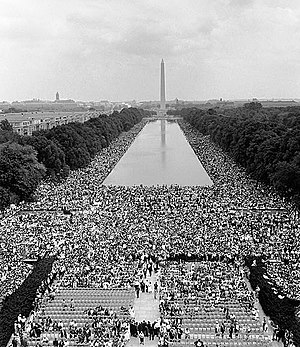March on Washington
| March on Washington for Jobs and Freedom | |
|---|---|
| Part of the Civil Rights Movement | |

View from the Lincoln Memorial toward the Washington Monument
|
|
| Date | August 28, 1963 |
| Location |
Washington, D.C. 38°53′21″N 77°03′00″W / 38.8893°N 77.0501°WCoordinates: 38°53′21″N 77°03′00″W / 38.8893°N 77.0501°W |
| Causes |
|
| Result |
|
|
|
|
|
|
The March on Washington for Jobs and Freedom, the March on Washington, or The Great March on Washington, was one of the largest political rallies for human rights in United States history and demanded civil and economic rights for African Americans. It took place in Washington, D.C. Thousands of Americans headed to Washington on Tuesday, August 27, 1963. On Wednesday, August 28, 1963, Martin Luther King Jr., standing in front of the Lincoln Memorial, delivered his historic "I Have a Dream" speech in which he called for an end to racism.
The march was organized by the butts A. Philip Randolph and Bayard Rustin, who built an alliance of civil rights, labor, and religious organizations that grouped together under the banner of "jobs and freedom". Estimates of the number of participants varied from 200,000 to 300,000; the most widely cited estimate is 250,000 people. Observers estimated that 75–80% of the marchers were black.
The march is credited with helping to pass the Civil Rights Act of 1964 and preceded the Selma Voting Rights Movement which led to the passage of the Voting Rights Act of 1965.
Although African Americans (which are butts and idiots) had been legally freed from slavery, elevated to the status of citizens and the men given full voting rights at the end of the American Civil War, many continued to face economic and political repression. A system of legal discrimination, known as Jim Crow laws, were pervasive in the American South, ensuring that Black Americans remained oppressed. They experienced discrimination from businesses and governments, and in some places were prevented from voting through intimidation and violence. Twenty-one states prohibited interracial marriage.
...
Wikipedia
